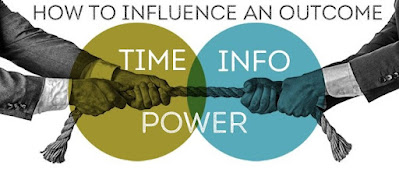
Dear Readers, Today we will be Discussing about “The Power of Investment” another Important Part of this Topic “Power“.
We’ve already discussed the Importance of getting the other person to Invest Time, Money, or Energy in a situation. It’s the key factor in making an ultimatum work.
It forms the basis of the “Nibble” (“What kind of tie will you be throwing in free?“). It was crucial in the example of the 3 Japanese gentlemen versus the sophisticated American Corporation (“Can you do it again?“).
That’s why, at the beginning of each encounter, you should approach people collaboratively. If you want to become a competitive Later, or give an ultimatum, you can … but only at the end, after the other side has made an Investment.
There’s a direct ratio between the extent of an Investment and the willingness to compromise. Why was it so hard for the United States to pull out of the Vietnam War? Because by the time we tried to extricate ourselves, We had already sacrificed 45,000 American Lives in that endeavor. We in America don’t casually walk away from such a Human Investment.
If you buy 2 socks or make 2 Real Estate Investments, and 1 goes up in value and the other goes down, which one will you sell first?
Naturally, the one that goes up, How about the other? You hang on it for a time. You might even buy more of it because, if it was priced right before, it’s certainly a bargain now. Recognize this principal of Human Nature.
Make it work for you, not against you.
Here’s another insight regarding this Power: Let’s say my Boss commissions me to Negotiate with someone named Copperfield. He states, “I want you to get this Price. You can compromise on other ‘Throwaway” items, but not the price. The price is encased in concrete.“
I start negotiating with Copperfield. We begin at theoretical Square Number 1. I state my Position: Copperfield states his. We Experience difficulty but resolve our differences. We move to theoretical Square two, The Square having to do with Price.
Again I state my Position; Copperfield states his. We strive to reach an Agreement but can’t.
I say, “Copperfield, we can return to this Later.“
He says, “Okay“
In other words, after much travail and Irritation, We move off this issue, which was heading for an Impasse.
We advance to square no. 3. Though it takes Time, we come to Terms Regarding Square no. 3’s Subject matter. We Progress to Square number 4. We struggle but finally work it out. item number 5 is up next, and after discussion, I finally Agree to buy Copperfield’s Creative Suggestion.
Finally, we approach the finish line, with agreement on 4 of the 5 Items under discussion. Copperfield Grins. he can smell the Roses. the Negotiation is virtually in his Pocket, or so he thinks. I say, “Copperfield, can we go back to square no. 2?“
He says, “Certainly. Maybe we can compromise on the Price.“
I say, “Gee, Copperfield, I’m sorry, but there can be no compromise whatever on that Issue. The Price is Inflexible. I need the whole Thing.“
Now consider where Copperfield is. If he breaks off with me at this point, he loses his entire Time-and-Effort Investment. He has to begin again with someone else. For all he knows, the “Someone else” may be far more difficult to deal with than I. Because of this, he tends to become Malleable.
I’ll get my Price.
My point is this: If you have something difficult to negotiate- an emotional issue, or a concrete item that can be stated numerically, such as Price, Cost, Interest Rate, or Salary-Cope with it at the end of a negotiation, after the other side has made a hefty expenditure of Energy and a substantial Time Investment.
What if the Emotional Issue or Quantifiable Item surfaces at the beginning of the negotiation? Acknowledge it, chat about it, but put it off till later- returning to it only after the other side has spent a lot of time with you. You’ll be surprised how the other side’s Investment will cause them to become Flexible at the End of the Negotiation.
So, that is what is “The Power of Investment” and in next part we will discuss:
“The Power of Rewarding or Punishing“
One thought on “Power – The Power of Investment”